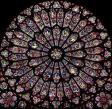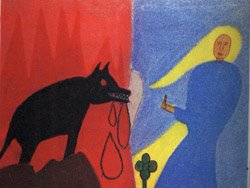China brings John Lennon’s Imagine to the Olympics
In the first ads for the 2008 Olympics in China, aired last night on prime-time television, the theme song used was John Lennon’s Imagine. Some thoughts on that below from Quigley in Exile.
Free as a Bird: John Lennon's Unfinished Journey
On the 25th Anniversary of His Death
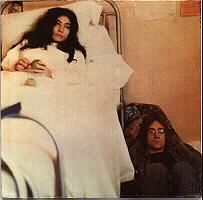 "Is it not written in your law . . . you are gods?" John 10:34
"Is it not written in your law . . . you are gods?" John 10:34
"The crosses are all full," said the lay brother.
"Then we must make another cross. If we do not make an end of him another will, for who can eat and sleep in peace while men like him are going about the world?" - "The Crucifixion of the Outcast," Celtic tale retold by William Butler Yeats in Mythologies
"Zen demands intelligence and will-power, as do all the greater things which desire to become real." These are the words of C. G. Jung in the introduction to D.T. Suzuki’s An Introduction to Zen Buddhism. Jung’s words and observations would win him a place top row center, right next to Edgar Allen Poe, on the cover of Sgt. Peppers. In the 1950s Suzuki was always referred to as Dr. Suzuki – much as Richard Gere is referred to as only Richard today by Tibetan Buddhists. It is kind of an honorarium, a title. Dr. Suzuki was a solid forefather on the path East and one of the very first learned Masters to come from the East to the West.
 In the 1950s he taught at Columbia University and was a celebrity in New York City, an exotic but common monk with a great smile and a pure vision of Zen. Personal experience is everything in Zen, said Dr. Suzuki. No ideas are intelligible to those who have no backing in experience. Mystification is far from being the object of Zen itself, but to those who have not touched the central fact of life Zen inevitable appears as mystifying. Penetrate through the conceptual superstructure and what is imagined to be a mystification will at once disappear, and at the same time there will be an enlightenment known as satori.
In the 1950s he taught at Columbia University and was a celebrity in New York City, an exotic but common monk with a great smile and a pure vision of Zen. Personal experience is everything in Zen, said Dr. Suzuki. No ideas are intelligible to those who have no backing in experience. Mystification is far from being the object of Zen itself, but to those who have not touched the central fact of life Zen inevitable appears as mystifying. Penetrate through the conceptual superstructure and what is imagined to be a mystification will at once disappear, and at the same time there will be an enlightenment known as satori.
Dr. Suzuki talked straight: personal experience is everything in Zen. The purpose of life is love. I’m not sure if John Lennon read these words but perhaps his wife, Yoko Ono, did. She was a key figure in the avant garde art scene in New York City at the time and had been in New York for a long time, even as a student at Sarah Lawrence. She was well known as a conceptual artist before she met John Lennon, and lived and worked in the same realm as people like John Cage and Marcel Duchamp. These would be the first people in New York to listen to Dr. Suzuki.
The art students were always the first to catch on, and John Lennon and his friend Stu Sutcliffe were the art students who started The Beatles. They were like pilot fish for the rest of us who were born at the end of the war and it was quite a large school of fish. 40 million people. All our fathers had been warriors. We were all the same age and born within months of one another, conceived by men who had been a long time without women, directly on return from war in Asia and Europe.
For us it was a bristling, exciting respite between childhood and adulthood and we were interested in new things. There were no teachers around to deflect our learning, no priests to lead us astray. For the briefest period, all of the shields were down. Other voices would come shortly. Swami Yogananda, who wrote The Autobiography of a Yogi, would become very popular for awhile. John said he read about half of it, which I thought was pretty good, as I’d only managed about 80 pages. Later, the Maharishi Mahesh Yogi and Tolstoy. But Suzuki’s message entered the river of our generation at the same time as John entered our river. At first much of the Zen around New York was dark, misunderstood in the West as nihilism, the shadow which withered the Western heart after 500 years of exploration and dominance. But John and Stu understood Dr. Suzuki’s Zen message that love is the purpose of life.
who wrote The Autobiography of a Yogi, would become very popular for awhile. John said he read about half of it, which I thought was pretty good, as I’d only managed about 80 pages. Later, the Maharishi Mahesh Yogi and Tolstoy. But Suzuki’s message entered the river of our generation at the same time as John entered our river. At first much of the Zen around New York was dark, misunderstood in the West as nihilism, the shadow which withered the Western heart after 500 years of exploration and dominance. But John and Stu understood Dr. Suzuki’s Zen message that love is the purpose of life.
 John is said to have started The Beatles to have something to do with Stu. When McCartney entered the group he drove them to become more serious and businesslike. But at first it was always John and Stu. Stu had the artist’s eye for style – naming the group The Beatles after seeing Lee Marvin and Marlon Brando in The Wild Ones. Lee Marvin’s motorcycle gang was called The Beetles. Stu always attracted the coolest people as well. And when they went to Berlin before the group was fully formed he attracted the beautiful photographer Astrid Kirchherr, who would become an anima figure
John is said to have started The Beatles to have something to do with Stu. When McCartney entered the group he drove them to become more serious and businesslike. But at first it was always John and Stu. Stu had the artist’s eye for style – naming the group The Beatles after seeing Lee Marvin and Marlon Brando in The Wild Ones. Lee Marvin’s motorcycle gang was called The Beetles. Stu always attracted the coolest people as well. And when they went to Berlin before the group was fully formed he attracted the beautiful photographer Astrid Kirchherr, who would become an anima figure – a muse – to the group and open them up in the mind in new ways and awaken new music and images.
– a muse – to the group and open them up in the mind in new ways and awaken new music and images.
An avante garde photographer in Germany, she and her friends, including Klaus Voorman, traveled in the seedy night scene in Berlin and met the group there, which was still going under the name of The Silver Beatles. She gave them the playful Beatles haircuts. Friendship would bind them. Stu married Astrid and Klaus later drew the cover picture for the Revolver album, and much later, after The Beatles had broken up, he played as a background musician on the Imagine album.
Personal experience would guide the fledgling poet as well, and like many ordinary men before him, Lennon became great when someone he loved died. He would remember them all. And he would remember Stu, who never returned to England with them.
I know I’ll always feel affection, for people and things that went before. I know I’ll always think about them.
But it was different with Stu.
In my life, I loved you more.
This requiem, this love song, is considered today to be one of the greatest songs ever written. It is the beginning of the artist’s journey for John Lennon.
 The Sixties was a cacophony of a million sounds and smells and voices and music and colors and textures, but especially music. The electric guitar was like a key; an ancient iron ornamented key to a mediaeval dream door that would open to an age.
The Sixties was a cacophony of a million sounds and smells and voices and music and colors and textures, but especially music. The electric guitar was like a key; an ancient iron ornamented key to a mediaeval dream door that would open to an age.
Every age, be it short or long, has a beginning, a middle and an end, like a person’s life, and this age was no exception. This age, someone pointed out, came with its own sound track. And it rose and fell rather quickly.
At the center was The Beatles and the Sixties rose and fell with the fate of the Beatles. And at dead center, the man in the center of the Beatles was John Lennon.
From beginning to end The Beatles was about John Lennon. He was not the most important innovator or instigator of the period, except perhaps in music, but the music would eventually become secondary to his life, as literature had become secondary to Tolstoy.
He was one of us, common and working class, but of course, more gifted. And the transformation he made, we made. Eventually he left The Beatles behind to complete the passage himself. He was the Man at the Center who made passage with us and for us and completed the journey on our behalf. And I don’t think we could have or would have completed passage without him.
The remaining Beatles say they were transformed by Bob Dylan like the rest of us were. John was as well. It shows in his pictures. It shows in his clothes and in music like Norwegian Wood, a folksy, spare song inspired by the folk scene, written when the Beatles would begin to rise to a higher artistic level. John, they say, wanted to conquer the world, which The Beatles did with ease. Then, when they heard Bob Dylan, they aspired to be artists.
 Dylan opened the gate and performed the Rite of Entry to the age with his soulful cohort Joan Baez, and the age rose to the center when The Beatles reached their artistic apex. Then followed the rite of exit with Joni Mitchell and the howling animal cries of Neil Young, mourning the passing of the brief and sacred moment.
Dylan opened the gate and performed the Rite of Entry to the age with his soulful cohort Joan Baez, and the age rose to the center when The Beatles reached their artistic apex. Then followed the rite of exit with Joni Mitchell and the howling animal cries of Neil Young, mourning the passing of the brief and sacred moment.
The Beatles, at the top of their creative arc -- that would be somewhere within the Sgt. Peppers area -- brought the defining moment to a generation. Some 30 years later, in January, 2001, New York Times columnist Maureen Dowd contrasted the generation with George Bush, Jr., who last week threatened to cast the first veto of this presidency to overthrow Congress’s attempt to ban his policy of allowing the torture of military prisoners.
In his first month in office she wrote, “He said he never liked the Beatles after they got into that ‘kind of a weird psychedelic period.’” One either crossed the river or did not, and those who did not, struggled to create a counter-force. (Ten weeks into his presidency Dowd reported going hungry for a shred of modernity. “Bush II has reeled backward so fast, economically, environmentally, globally, culturally, it’s redolent of Dorothy clicking her way from the shimmering spires of Oz to a depressed black-and-white Kansas,” she lamented. “What’s next? Asbestos, DDT, bomb shelters, filterless cigarettes? Patti Page?”)
Not unlike George Bush, John Lennon was preoccupied with Jesus. You could see it early on with the trouble he got into when the Beatles were first big. Fans would crowd them and overwhelm them and once John said to a crowd of reporters, “We’re more popular than Jesus.” There was no arrogance to it, but subtle awareness. The Beatles were more popular than Jesus. Yet Bush and Lennon couldn’t be more far apart in their quests.
In The Tao of Jung, psychiatrist and Jung scholar David H. Rosen discusses C.G. Jung’s decent into the shadowy world of the collective unconscious, the world beyond the conscious ego. On the way into the “cave” of the unconscious stood a dwarf with a leathery skin, as if he were mummified, which Jung squeezed past. Rosen explains this in terms of Indian mythology: “Shiva steps on a dwarf that represents the ego when this deity does its creative dance of death and rebirth.”
Likewise with the Beatles. When they began their real creative work, they left behind the casings of their early ego identity, pictured as four mop-top wax dummies in early Beatles suits at what appears to be a burial on the cover of the Sgt. Peppers album, while the “new” Beatles appeared above like butterflies just left the cocoon in brightly colored satins and playful epaulets.
at what appears to be a burial on the cover of the Sgt. Peppers album, while the “new” Beatles appeared above like butterflies just left the cocoon in brightly colored satins and playful epaulets.
At the building vortex of their work, John went through a classic shaman’s arc, the same as the one described by Dante in The Divine Comedy; the same ascribed to Jesus by his followers thus, “. . .he descended into hell the third day . . . . he ascended into heaven.” (As E.C. Krupp writes that Santa Claus, an archaic remnant of a Norse shaman, enters the subtle realms of the archetypal shamanic journey by descending the chimney to the Underworld and flying through the Cosmic Heavens with magical reindeer.)
 This is the classic pattern of the journey of the shaman described by anthropologists and it occurred with John as the Beatles rose to the top of their creative arc. IN this kind of psychological transformation, the man or woman who is about to enter into Unconscious falls, out of nowhere and against his or her will, into a funk. He falls into a torpor, a sickness of the mind and heart and feels a worthlessness to his life. He goes through a period of spiritual death and descends deep into the earth. Afterwards, he ascends and rises into heaven. Finally he emerges transfigured and enlightened god king, leaves the celestial place and comes out, usually down from a mountain, with a simple transforming idea for the tribe, a gift from the Land of the Dead.
This is the classic pattern of the journey of the shaman described by anthropologists and it occurred with John as the Beatles rose to the top of their creative arc. IN this kind of psychological transformation, the man or woman who is about to enter into Unconscious falls, out of nowhere and against his or her will, into a funk. He falls into a torpor, a sickness of the mind and heart and feels a worthlessness to his life. He goes through a period of spiritual death and descends deep into the earth. Afterwards, he ascends and rises into heaven. Finally he emerges transfigured and enlightened god king, leaves the celestial place and comes out, usually down from a mountain, with a simple transforming idea for the tribe, a gift from the Land of the Dead.
Lennon went through such a transformation, falling into a psychological funk and getting fat and afraid at the peak of the Beatles initial popularity (“Help,” he sang. “I’m a loser, and I’m not what I appear to be.”) Then at the Revolver album, something new began to happen. Suddenly there is a sense of entering the river, an image which occurs in dreams at times of birth or death (“turn off your mind, relax and float downstream,”) and at times of psychological transformation. In Buddhism and Taoism, it is the sign of a new awakening.
initial popularity (“Help,” he sang. “I’m a loser, and I’m not what I appear to be.”) Then at the Revolver album, something new began to happen. Suddenly there is a sense of entering the river, an image which occurs in dreams at times of birth or death (“turn off your mind, relax and float downstream,”) and at times of psychological transformation. In Buddhism and Taoism, it is the sign of a new awakening.
He sang a second song on the same album about floating downstream in a transcendent, blissful sleep, while everyone thinks he is just lazy, (but “I don’t mind,” he sings, “I think they’re crazy”). Some say I’m Only Sleeping is aesthetically the best song he ever composed.
In terms of anthropology, this is the first orientation of an earth shaman finding his feet in the Underworld – the creative unconscious – the world under the earth, where he will take you down with him into the density of the earth, but this is the Subtle Realm of the earth, the Underworld, where “nothing is real” in Strawberry Fields.
And there he finds clarity and confidence, but in a new world, the world of the Unconscious where there is understanding of all you see with eyes closed, and the old world becomes a shell, a mere caricature of psychic life.
The shaman then ascends out of the earth and into the sky, like Jesus rising out of the tomb and entering heaven. John and the Beatles rise then to the very height of their work in Sgt. Peppers Lonely Hearts Club Band. And here at their best work is the shaman’s archetypal journey to the heavens in Lucy in the Sky with Diamonds. Like the Underworld of Strawberry Fields, the Astral Heavens also have otherworldly features, like newspaper taxies and magical rivers with tangerine trees and marmalade skies (like the tree “showered with reddish blossoms” blazed in light, a cosmic vision Jung had – a “vision of unearthly beauty” which oddly enough, took place in Liverpool, home of the Fab Four. Lennon’s dream vision in Lucy in the Sky with Diamonds also echo’s Dante’s, looking upon the stars from above, in Paradise: “I saw light in the shape of a river/Flashing golden between two banks/Tinted in colors of marvelous spring./Out of the stream came living sparks/Which settled on the flowers on every side/Like rubies ringed with gold . . .”).
to the heavens in Lucy in the Sky with Diamonds. Like the Underworld of Strawberry Fields, the Astral Heavens also have otherworldly features, like newspaper taxies and magical rivers with tangerine trees and marmalade skies (like the tree “showered with reddish blossoms” blazed in light, a cosmic vision Jung had – a “vision of unearthly beauty” which oddly enough, took place in Liverpool, home of the Fab Four. Lennon’s dream vision in Lucy in the Sky with Diamonds also echo’s Dante’s, looking upon the stars from above, in Paradise: “I saw light in the shape of a river/Flashing golden between two banks/Tinted in colors of marvelous spring./Out of the stream came living sparks/Which settled on the flowers on every side/Like rubies ringed with gold . . .”).
At the peak, John wrote a song called I am the Walrus in which he invoked the Upanishads, which along with The Autobiography of a Yogi was very popular back in those days. John wrote, “I am he,” about the swimming together of all of us at the peak of the Sixties, and “we are all together.” “I am the Eggman,” he sang, with his characteristic Liverpool humor, “. . . they are the Eggmen. I am the Walrus.”
 Lennon’s favorite book was Alice in Wonderland and the Abbey Road album contained a snippet of Lewis Carroll's prose. He may have drawn on Lewis Carroll’s wise Walrus, who would fit right in on Sgt. Peppers, holding forth on cabbages and kings to a horde of oysters.
Lennon’s favorite book was Alice in Wonderland and the Abbey Road album contained a snippet of Lewis Carroll's prose. He may have drawn on Lewis Carroll’s wise Walrus, who would fit right in on Sgt. Peppers, holding forth on cabbages and kings to a horde of oysters.
It is all comic and hidden, but it reflects an awareness he had about being a man at the center of a world in transformation. The words, “I am he,” are from the core of Eastern spirituality and are well known to its practitioners. Shimon Malin’s recent book Nature Loves to Hide: Quantum Physics and Reality, a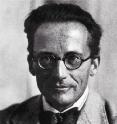 Western Perspective offers an explanation from science: He writes, “Erwin Schrödinger had the experience of finding the soul of the universe within himself, as his own ultimate identity. He expressed his finding as follows: Inconceivable as it seems to ordinary reason, you – and all other conscious beings as such – are all in all. Hence this life of yours which you are living is not merely a piece of the entire existence, but is, in a certain sense, the whole; only this whole is not so constituted that it can be surveyed in one single glance. This, as we know, is what the Brahmins express in the sacred, mystic formula which is yet really so simple and so clear: Tat twam asi, this is you [or I am he or this is that]. Or, again, in such words as ‘I am in the east and in the west, I am above and below, I am this whole world’.”
Western Perspective offers an explanation from science: He writes, “Erwin Schrödinger had the experience of finding the soul of the universe within himself, as his own ultimate identity. He expressed his finding as follows: Inconceivable as it seems to ordinary reason, you – and all other conscious beings as such – are all in all. Hence this life of yours which you are living is not merely a piece of the entire existence, but is, in a certain sense, the whole; only this whole is not so constituted that it can be surveyed in one single glance. This, as we know, is what the Brahmins express in the sacred, mystic formula which is yet really so simple and so clear: Tat twam asi, this is you [or I am he or this is that]. Or, again, in such words as ‘I am in the east and in the west, I am above and below, I am this whole world’.”
Malin writes that Wolfgang Pauli, when asked if he believed in a personal God, responded with an answer that suggests a mandala: “May I rephrase your question? I myself should prefer the following formulation: Can you, or anyone else, reach the central order of things or events, whose existence seems beyond doubt, as directly as you can reach the soul of another human being? I am using the term “soul” quite deliberately so as not to be misunderstood. If you put your question like that, I would say yes.”
This expression reflects the sentiment of the Upanishads in which the Atman (the Eggman) or the individual soul, finds itself at one with another individual soul, then another, then the whole soul, the world soul, the God consciousness, the Brahmin (the Walrus). It is what Jesus had become after he had gone through the Transfiguration, referring to himself as at one with the God force, at One with the Father. This is the Brahma consciousness.
 The Beatles were at their peak with Sergeant Peppers. There John would find fulfillment, anthropologically speaking. Then he would journey to the East, although Paul and Ringo were bored, and find the mystic Maharishi Mahesh Yogi, a father figure to him, but a Great Father, a spiritual father, not an earthly father.
The Beatles were at their peak with Sergeant Peppers. There John would find fulfillment, anthropologically speaking. Then he would journey to the East, although Paul and Ringo were bored, and find the mystic Maharishi Mahesh Yogi, a father figure to him, but a Great Father, a spiritual father, not an earthly father.
The shaman’s work is essentially over by then, except to bring the gift idea to the community. The shaman has brought the tribe with him through the transformation of the Unconscious. It is up to us after that.
Yet some of the Beatles greatest work would come as they traveled down the back side of the mountain. The White Album is still a favorite to fans. One song, I’m So Tired, wonderfully reflects the rite of exit of the exhausted artist that comes at the end of the transformational passage, balancing the liberating I’m Only Sleeping, at the rite of entry.
It is characteristic of the dark side of the passage that the archetypes reverse themselves and show themselves not as they are in the holistic form of the inner life, but just the opposite, shattered in the outside world, reflecting that the center has been passed through and we have once again entered the flat consciousness of the everyday world. And in this instance, it was a hostile world at war in Vietnam and on the streets and campuses of the United States (“Happiness is a warm gun,” sang John)
“Can one live with a shattered glass?” the guru classically asks a Tibetan monk who has just found Enlightenment.
And here – classically - the Beatles reject their psychological god-king, the Maharishi, and even publicly denounce him. Here John sings, “My mother is of the sky.” Lucy is of the sky, his anima, his female counterpart whom he found in transcendent journey. Mother is of the earth. And the tricksters continue their playful treachery, fooling their audience and keeping them off guard with pranks like this one: “ . . . here’s another clue for you all. The Walrus was Paul.”
The Walrus, of course, was John.
Coming off the backside of the mountain – and on return form India - John sometimes believed he was carrying – channeling, we say – Jesus and said so to the Beatles. And he made occasional references, even paraphrasing the Gospel of Thomas “. . . the inside is out/the outside is in. . .” on the White Album.
 The full text is, “Jesus said to them:/When you make the two one,/and make the inside like the outside,/and the outside like the inside,/and the upper side like the under side,/and (in such a way) that you make the man/(with) the woman a single one,/in order that the man is not man and the/woman is not woman; when you make eyes in place of an eye,/and a hand in place of a hand,/and a foot in place of a foot,/an image in place of an image;/then you will go into [the kingdom].” – from The Gospel of Thomas.
The full text is, “Jesus said to them:/When you make the two one,/and make the inside like the outside,/and the outside like the inside,/and the upper side like the under side,/and (in such a way) that you make the man/(with) the woman a single one,/in order that the man is not man and the/woman is not woman; when you make eyes in place of an eye,/and a hand in place of a hand,/and a foot in place of a foot,/an image in place of an image;/then you will go into [the kingdom].” – from The Gospel of Thomas.
This preoccupation with Jesus appears again and again. “Christ, you know it ain’t easy,” he sang in one of his last songs, suggesting in The Ballad of John and Yoko that he, like Jesus, would be crucified.
 Certainly Lennon made himself look like Jesus at the end of the Beatles. On their last album cover, Abbey Road, he is dressed all in white, like Jesus after the Transfiguration, with the Beatles trailing him across the road, like the Three Celestial Ones (see this blog in January, 2006 for the Three Celestial Ones), following in his wake. (And cultism would abound in the Beatle myth. The old Catholic myth about the three secrets revealed to the
Certainly Lennon made himself look like Jesus at the end of the Beatles. On their last album cover, Abbey Road, he is dressed all in white, like Jesus after the Transfiguration, with the Beatles trailing him across the road, like the Three Celestial Ones (see this blog in January, 2006 for the Three Celestial Ones), following in his wake. (And cultism would abound in the Beatle myth. The old Catholic myth about the three secrets revealed to the children at Fatima by the Blessed Mother took a pernicious turn into hippie lore in the late 1990s when the Pope revealed the third secret to be about a “man in white” who would be gunned down when he returned from the mountain top. The Pope, who had been wounded in an attack at the same time that Lennon was murdered, revealed the contents of the letter to the public because he said the prophecy had been fulfilled. John Paul II, who wore white garments at public ceremonies, claimed to be the man identified in the prophecy.)
children at Fatima by the Blessed Mother took a pernicious turn into hippie lore in the late 1990s when the Pope revealed the third secret to be about a “man in white” who would be gunned down when he returned from the mountain top. The Pope, who had been wounded in an attack at the same time that Lennon was murdered, revealed the contents of the letter to the public because he said the prophecy had been fulfilled. John Paul II, who wore white garments at public ceremonies, claimed to be the man identified in the prophecy.)
 Even later, at the very end of his life Jesus is suggested. All through the most creative period, the shaman’s journey from Sgt. Peppers to the end of Abbey Road, John wore a special flowered talisman around his neck. Afterwards, he stopped
Even later, at the very end of his life Jesus is suggested. All through the most creative period, the shaman’s journey from Sgt. Peppers to the end of Abbey Road, John wore a special flowered talisman around his neck. Afterwards, he stopped wearing it. But in New York, in one of the later pictures ever taken of him, a well-known photograph where he is wearing a t-shirt that says New York City across the front, there is a tiny cross hanging from his neck.
wearing it. But in New York, in one of the later pictures ever taken of him, a well-known photograph where he is wearing a t-shirt that says New York City across the front, there is a tiny cross hanging from his neck.
At the end of the Beatles period John continued in a prophet’s journey. Like Moses and the Bodhisattva, he returns from a celestial vision on top of the mountain with a simple transforming idea, as Moses did with the tablets.
It is the same idea that has occurred throughout the century but is new to our century here in the West. It is Emerson’s message and here it is again expressed ten years before the Beatles by C.G. Jung: “Our world has shrunk, and it is dawning on us that humanity is one, with one psyche. Humanity is a not inconsiderable virtue which should prompt Christians, for the sake of charity – the greatest of all virtues – to set a good example and acknowledge that though there is only one truth it speaks in many tongues, and that if we still cannot see this it is simply due to lack of understanding. No one is so godlike that he alone knows the true word.” As Woodstock guru Satchidananda put it, “One truth, many paths.”
is a not inconsiderable virtue which should prompt Christians, for the sake of charity – the greatest of all virtues – to set a good example and acknowledge that though there is only one truth it speaks in many tongues, and that if we still cannot see this it is simply due to lack of understanding. No one is so godlike that he alone knows the true word.” As Woodstock guru Satchidananda put it, “One truth, many paths.”
It is the same idea that Leo Tolstoy, a Great Father figure to the non-violence movement of the Sixties, had brought to the world after his night of the dark soul when he went through a religious transformation.
 Lennon, with his wife Yoko Ono, entered the peace movement when he left the Beatles, and like Tolstoy later in life, attempted to apply his natural gifts didactically to public purpose. He is said to have been reading Tolstoy’s late non-fiction work on religion and non-violence as many were in the late 1960s, and his final word, the simple transforming idea he brought down from the mountain is precisely the same thought as Tolstoy’s: Imagine there’s no country, it isn’t hard to do. . . Imagine all the people living life in peace.
Lennon, with his wife Yoko Ono, entered the peace movement when he left the Beatles, and like Tolstoy later in life, attempted to apply his natural gifts didactically to public purpose. He is said to have been reading Tolstoy’s late non-fiction work on religion and non-violence as many were in the late 1960s, and his final word, the simple transforming idea he brought down from the mountain is precisely the same thought as Tolstoy’s: Imagine there’s no country, it isn’t hard to do. . . Imagine all the people living life in peace.
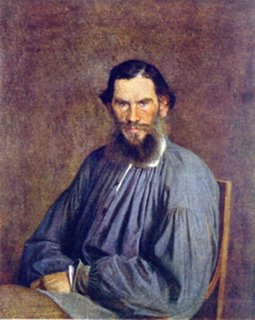 Tolstoy claimed that there was one singular thought in Christ’s work and that was do not return violence with violence. On this he built the doctrine that would inspire Ghandi and Martin Luther King, Jr. and the anti-war activists of the 1960s. Furthermore, in Patriotism and Government, Tolstoy wrote that patriotism was a practicable solution for nations early in their development, but it was time now to abandon national prejudices. Even Ghandi, who he corresponded with and who admired Tolstoy enormously, had failed in this, he said. The non-violent approach was the right approach, but, said Tolstoy, declaring the nation to be Hindu, “ruins everything.”
Tolstoy claimed that there was one singular thought in Christ’s work and that was do not return violence with violence. On this he built the doctrine that would inspire Ghandi and Martin Luther King, Jr. and the anti-war activists of the 1960s. Furthermore, in Patriotism and Government, Tolstoy wrote that patriotism was a practicable solution for nations early in their development, but it was time now to abandon national prejudices. Even Ghandi, who he corresponded with and who admired Tolstoy enormously, had failed in this, he said. The non-violent approach was the right approach, but, said Tolstoy, declaring the nation to be Hindu, “ruins everything.”
It was time for the removal of all barriers. No country, and no religion, too. This would be Lennon’s final impression on the people: Imagine there’s no heaven, it’s easy if you can, no hell below us, a brotherhood of man.
This is precisely Tolstoy’s religious conviction at the end of his life. He advocated abandoning identity with a particular prophet as one would abandon nationalism.
In one of his last writings on the subject Tolstoy clearly states his opinion: “Attributing a prophetic mission peculiar to certain beings such as Moses, Christ, Krishna, Buddha, Muhammad, Haha’u’llah as well as several others is one of the major causes of division and hatred between men.”
John’s swan song, Imagine, reflects timeless Buddhist sentiment like that presented in What the Buddha Taught by Walpola Rahula, which had gained popularity in the Sixties. And is likely an intentional reconstruction of Tolstoyan philosophy which was deeply influenced by Buddhism and Taoism. Intended or not, it completes the shaman’s journey and begins the transformation of the group.
Imagine also bears a relationship to The Gospel of Thomas. Elaine Pagel's book Beyond Belief: The Secret Gospel of Thomas, states that in Thomas’s account, Jesus challenges those who mistake the kingdom of God for an otherworldly place or a future event: Jesus said, “If those who lead you say to you, Look, the kingdom is in the sky,’ then the birds of the sky will get there before you . . .” In a word, Imagine there’s no heaven.
William Butler Yeats writes: “What portion in the world can the artist have/Who has awakened from the common dream/But dissipation and despair?” Such was the lot of John Lennon.
Late in life, broken and in pain, he wrote, “I was the Walrus, but now I’m John.”
One of his biographers writes that he was never happy again after the Sgt. Peppers period. The pictures show it. He never smiled again for the camera after he returned from India.





